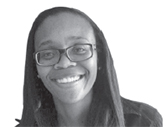
KAMARA TAYLOR
(First of two parts. Second part to be published in May.)
The universal feeling that we as human beings can relate to is loss, if that is in the form of losing a job, or game, a loved one, losing time, or losing in life in some capacity. But how we handle grief is what causes us to differ in how we cope.
In the midst of unexpected losses in my life, my grieving process is to write. By writing, I manage unresolved emotions, and that can be seen as positive. However, someone else can choose to channel their grief through anger or mask it just to function or escape through denial.
Today, as I reflect on the backward thinking of many of us, I realize that maybe our approaches have been wrong. Just maybe racism and other -ism’s are part of a healing process that is very complicated. Coping with grief is usually a conditioned response passed down through families. Therefore, the way we grieve (whether it is the loss of dignity, attacks or discrimination) is by masking those things. We cover up the hurt by escaping through denial.
Today we mourn a loss of humanity as victims are blamed and predators are praised. We mourn the loss of civilization as we single out individuals based on differences and not commonalities. We mourn the loss of integrity as we allow others to be victimized through words or actions without intervention. The bystander effect is more alive than ever.
We mourn the loss of morality as sound bites and hiding behind social media posts have taken the place of actually coming together to unify a broken society with a harsh history of loss.
Today when we reflect, I wonder if just for a second we can see our hurt and ideas stem from unrecognized loss that we haven’t pinpointed. Can we see this is how we have chosen to grieve.
However, the truth is grieving has no set emotional components, but we can all agree the healing is what remains complicated. How do we begin to heal if we don’t recognize the loss and grief.
Food for thought keeping it real.

Recent Comments